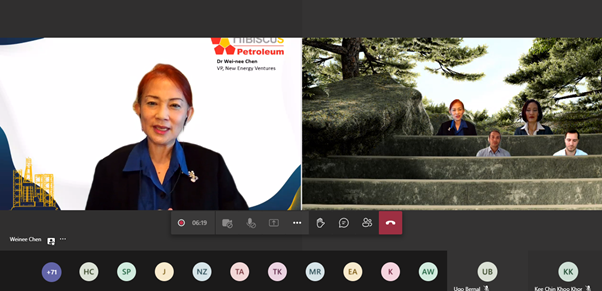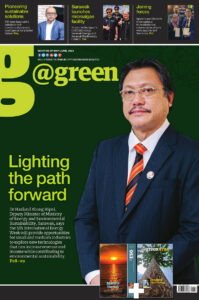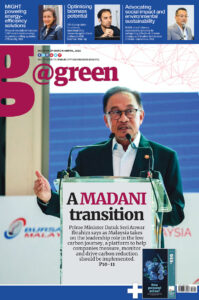Crucial for sustainability
Pandemic has impacted different industries differently
BY FATIHAH MANAF
Opting for alternative energy resources is the way to go for many businesses. Realising this fact, many industry players have started to incorporate sustainability aspects across their operations.
In conjunction with its Sustainability Week, AMCHAM Malaysia held a virtual discussion on ‘Renewable Energy: Crucial for Sustainability’ to discuss how companies could achieve sustainability through solar adoption and how they achieved their business sustainability.

The session featured three experienced speakers – Kee Chin Khoo Khor (Manager, of First Solar Sdn Bhd), Ugo Siegfried Bernal (VP Sustainability Solutions of BECIS) and Antoine Wagschal (Manager – Business Development and Sales SE Asia of First Solar FE Holdings).
The effects of the pandemic on solar industry
Kee Chin said the impact of the pandemic on First Solar was no different. The outbreak was stated to have affected First Solar’s unique approach, sourcing, and manufacturing process. The 18-month period also changed the way they worked in the company.
She explained the pandemic had urged the company to add extra measures to its existing stringent health and safety protocol.
She said: “Of course, we have no immune to it, and I’m still learning.”
Kee Chin highlighted that the pandemic impacted different industries differently. She then gave an example of the supply chain for a silicone manufacturer.
She added: “I will say the key is on simplicity. The more complexity of the supply chain, the harder it is to recover from the unprecedented situation.
“For the development and EPC, it has shown that diversification of a supply chain is critical for continuity in the pandemic.”

She, however, said that this supply chain situation had the risk of price volatility for the crystalline silicon panels.
“Unlike other PV companies, First Solar has a unique one-product architecture,” Kee Chin explained.
The architecture referred to a fully integrated process under one roof, controlled by a single setup of global specifications for Bill of Materials components, which resulted in the manufacturing of high-quality products in multiple sites.
She also highlighted the strict SOPs in First Solar’s workforce management as the company continuously promoted working from home.
Price increase in the supply chain
Bernal agreed that the pandemic had resulted in the price rise and stated that it could be complicated to absorb the cost, especially in an already competitive market like Malaysia.
“What’s important for us as a developer is how do we keep and preserve the quality that we’ve proposed to our client,” said Ugo.
Since BECIS adopted a long-term partnership approach, he said it was essential to ensure the quality of the installed equipment. In providing the quality, the cost of modules might have come as too high for some developers.
“And one of the concerns that we have is some contracts will be cancelled or returned, and this will delay the energy transition of the companies,” said Ugo.
Wagschal then explained the two factors of the price increase, which were the increase of price in raw materials and the increase of price in logistic costs or sea freight costs. He said that the price increase in raw materials did not really impact First Solar.

“At First Solar, we’re not using monocrystalline or polycrystalline technology. We’re using our proprietary thin-film technology. Therefore, we have not been impacted by the increase of price on the polysilicon pricing.
However, we do use glass, and our modules need to be shipped. So, it means the increase of logistic costs has also impacted us,” said Wagschal.
He then agreed that the pandemic would delay the transition to a more sustainable future.
ESG compliance in the solar business
Wagschal emphasised that the ESG agenda was not just about compliance at First Solar. He stated that ESG allowed the company to minimise costs, reduce risks, and differentiate itself from competitors. He said that the sustainability aspect at First Solar, which was good for the environment, also increased revenue for the company.
“As mentioned, sustainability has always been at the core of our business from the beginning. We have a resource-efficient manufacturing process, less carbon, fewer water footprints. At the end of the life of the product, we can recycle the PV modules.
“We committed to going 100 per cent renewable energy across our global operations by 2020. This enables us to reduce the carbon footprint by

40 per cent,” said the business development and sales manager.
He explained that France government had integrated carbon footprint criteria into its tender process. This meant priority would be given to projects with lower carbon footprint equipment. He stated that many corporate buyers had also taken the environmental aspect seriously and adopting RE in their projects.
“We do encourage more countries to follow such low carbon footprint approaches,” he said.
Bernal then said that ESG was not an internal cost at BECIS. As an investor, reputation was necessary, and many other aspects such as customers and contracts should be considered. However, from the customer’s point of view, sustainability could be seen as a cost.
He said: “It’s quite important not to classify the solar development as an ESG target. It could be at some point, but most of our discussions are commercial negotiations.”
Environmental issues caused by solar industry
Kee Chin acknowledged the environmental issue which resulted from the usage of raw materials in the manufacturing process. She stated that since PV was expected to be the fastest-growing energy source by 2050, the environmental and sustainability aspects and future waste burden were always in question.
She then emphasised that the world had limited resources. To address this issue, First Solar took a circular route.
“So, First Solar contributes to a circular economy, starting from the raw ingredient which is a by-product of the mining industry. This is turned into eco-efficient PV technology in our panel that can generate electricity for 30 years and more.
“First Solar takes full integrated responsibility on product lifecycle, from turning the mining by-product I mentioned just now, with the lowest environmental footprints. We’re minimising the energy, water, waste generation into our highly efficient manufacturing operation,” she said, before stating that First Solar also disclosed its environmental and social performance for the public to see.
She also shared that First Solar had successfully reduced its greenhouse gas emission by half and water by 64 per cent in 2009.
The disposal of PV solar modules
The moderator, Dr Wei-nee Chen, VP of New Energy Ventures at Hibiscus Petroleum Bhd, then highlighted the forecast, which stated that by 2050, up to 78 million metric tonnes of solar panels would have reached the end of their life. She said the issue would cause the world to have six million tonnes of new solar waste annually.
In addressing this issue, Wagschal said that First Solar had its own solution. He said that the company had a long-standing leadership position in PV recycling.
Wagschal said: “We started this voluntary recycling programme more than 15 years ago. We have the recycling programme globally on an industrial scale.
“So, around the world, we can support our partners at the end of life of their solar modules with recycling capabilities.”
Wagschal said First Solar started the recycling programme in 2005. The company had also invested in PV recycling technology improvements since then.
He said that while most PV recycling processes were only recovering high mass fraction materials such as glass and frames, First Solar could recover approximately 95 per cent of the materials. The materials would then be reused in producing new modules.
“It can be recycled over 40 times,” he said.







